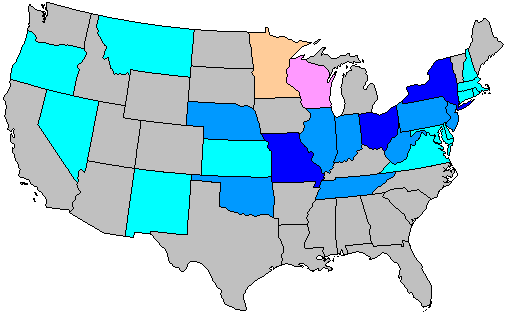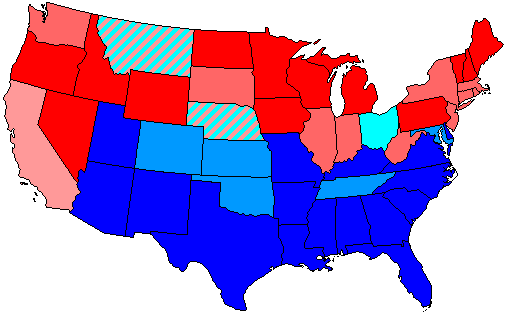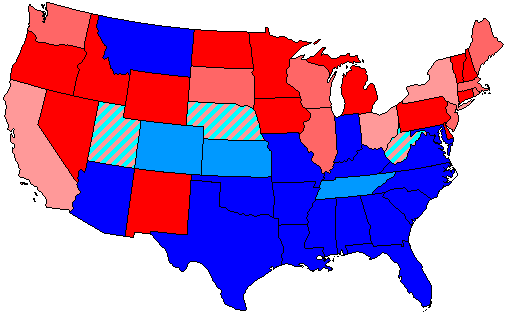|
Hawaii Territory's At-large Congressional District
Hawaii Territory's at-large congressional district was the congressional district for the Territory of Hawaii, which was established by the Newlands Resolution of 1898. On April 30, 1900, the Hawaiian Organic Act gave the Territory the authority to elect a single non-voting congressional delegate. After Hawaii's admission to the Union as the 50th state by act of Congress on August 21, 1959, this district was replaced by Hawaii's at-large congressional district. List of delegates representing the district References Sources * {{DEFAULTSORT:Hawaii Territory's At-Large Congressional District Former congressional districts of the United States At-large United States congressional districts Territory At-large Congress A congress is a formal meeting of the representatives of different countries, constituent states, organizations, trade unions, political parties, or other groups. The term originated in Late Middle English to denote an encounter (meeting of .. ... [...More Info...] [...Related Items...] OR: [Wikipedia] [Google] [Baidu] |
Delegate (United States Congress)
Non-voting members of the United States House of Representatives (called either delegates or resident commissioner, in the case of Puerto Rico) are representatives of their territory in the House of Representatives, who do not have a right to vote on proposed legislation in the full House but nevertheless have floor privileges and are able to participate in certain other House functions. Non-voting members may vote in a House committee of which they are a member and introduce legislation. There are currently six non-voting members: a delegate representing the District of Columbia, a resident commissioner representing Puerto Rico, as well as one delegate for each of the other four permanently inhabited U.S. territories: American Samoa, Guam, the Northern Mariana Islands and the U.S. Virgin Islands. A seventh delegate, representing the Cherokee Nation, has been formally proposed but not yet seated, while an eighth, representing the Choctaw Nation, is named in a treaty but has ne ... [...More Info...] [...Related Items...] OR: [Wikipedia] [Google] [Baidu] |
1906 United States House Of Representatives Election In Hawaii Territory
The 1906 United States House of Representatives elections were held in the middle of President Theodore Roosevelt's second term. As in many midterm elections, the President's Republican Party lost seats to the opposition Democratic Party, but retained a large overall majority. Dissatisfaction with working conditions and resentment toward union busting among industrial laborers in the Mid-Atlantic and Midwest caused these groups to turn out to the polls in large numbers in support of the Democratic Party. However, gains in these regions were not enough to remove the Republican majority or the firm support that the party held among the middle class. Special elections Election summaries Election dates In 1906, three states, with 8 seats among them, held elections early: * June 4 Oregon * September 4 Vermont * September 10 Maine Oklahoma was admitted in 1907 and held its first congressional elections on September 17, 1907. Alabama Arkansas California ... [...More Info...] [...Related Items...] OR: [Wikipedia] [Google] [Baidu] |
1922 United States House Of Representatives Election In Hawaii Territory
The 1922 United States House of Representatives elections were held for the United States House of Representatives in November 1922, in the middle of President Warren G. Harding's term. Just as voters had expressed their distrust of Wilson in 1920, now voters had a chance to express the widespread feeling that Congress had failed to address economic problems, especially the brief but sharp economic recession of 1921–1922. Most of the seats that Republicans lost had long been held by Democrats, who now returned with an even stronger base in the major cities. The Republican Party lost a net of 77 seats to the opposition Democratic Party. The Republicans were neither unified nor well led, and they could boast of very few successes except tax cuts for the wealthy and for corporations, and higher tariffs that pleased manufacturing interest but raised consumer prices. With Senator Bob La Follette as their unofficial leader, some progressives formed a small but highly vocal group o ... [...More Info...] [...Related Items...] OR: [Wikipedia] [Google] [Baidu] |
Democratic Party (United States)
The Democratic Party is one of the two major contemporary political parties in the United States. Founded in 1828, it was predominantly built by Martin Van Buren, who assembled a wide cadre of politicians in every state behind war hero Andrew Jackson, making it the world's oldest active political party.M. Philip Lucas, "Martin Van Buren as Party Leader and at Andrew Jackson's Right Hand." in ''A Companion to the Antebellum Presidents 1837–1861'' (2014): 107–129."The Democratic Party, founded in 1828, is the world's oldest political party" states Its main political rival has been the Republican Party since the 1850s. The party is a big tent, and though it is often described as liberal, it is less ideologically uniform than the Republican Party (with major individuals within it frequently holding widely different political views) due to the broader list of unique voting blocs that compose it. The historical predecessor of the Democratic Party is considered to be th ... [...More Info...] [...Related Items...] OR: [Wikipedia] [Google] [Baidu] |
William Paul Jarrett
William Paul Jarrett (August 22, 1877 – November 10, 1929) was a sheriff and congressional delegate representing the Territory of Hawaii. Biography Jarrett was born August 22, 1877 and grew up in Honolulu, Hawaii, on the island of Oahu, and attended Saint Louis School. Of Native Hawaiian descent, his father was William Kaauwai Jarrett and mother was Emma Kaoo Stevens. He married Mary H. K. Clark with whom he had six children. Jarrett became one of the earliest leaders of the Hawaii Democratic Party. Jarrett served as deputy Sheriff of the City & County of Honolulu from 1906 to 1908, Sheriff until 1914, and High Sheriff of the Territory of Hawaii from 1914 to 1922. From March 4, 1923 to March 3, 1927, Jarrett served in the United States Congress The United States Congress is the legislature of the federal government of the United States. It is Bicameralism, bicameral, composed of a lower body, the United States House of Representatives, House of Representativ ... [...More Info...] [...Related Items...] OR: [Wikipedia] [Google] [Baidu] |
1922 Hawaii Territory's At-large Congressional District Special Election
The 1922 United States House of Representatives elections were held for the United States House of Representatives in November 1922, in the middle of President Warren G. Harding's term. Just as voters had expressed their distrust of Wilson in 1920, now voters had a chance to express the widespread feeling that Congress had failed to address economic problems, especially the brief but sharp economic recession of 1921–1922. Most of the seats that Republicans lost had long been held by Democrats, who now returned with an even stronger base in the major cities. The Republican Party lost a net of 77 seats to the opposition Democratic Party. The Republicans were neither unified nor well led, and they could boast of very few successes except tax cuts for the wealthy and for corporations, and higher tariffs that pleased manufacturing interest but raised consumer prices. With Senator Bob La Follette as their unofficial leader, some progressives formed a small but highly vocal group o ... [...More Info...] [...Related Items...] OR: [Wikipedia] [Google] [Baidu] |
Henry Alexander Baldwin
Henry Alexander Baldwin or Harry Alexander Baldwin (January 12, 1871 – October 8, 1946) was a sugarcane plantation manager, and politician who served as Congressional Delegate to the United States House of Representatives representing the Territory of Hawaii. He was one of the earliest leaders of the Hawaii Republican Party. Life Alexander & Baldwin, one of the " Big Five" corporations that dominated Hawaii economics in the early twentieth century, was started by his father Henry Perrine Baldwin and uncle Samuel Thomas Alexander in 1869. His father was son of early missionary Dwight Baldwin, and his mother Emily Whitney Alexander was daughter of early missionary William P. Alexander. Born January 12, 1871 on the Baldwin house at the Paliuli sugar mill in the Kingdom of Hawaii on the island of Maui, between the towns of Pāia and Makawao, Hawaii. Baldwin was educated in Honolulu at Punahou School. His parents sent him to Phillips Academy in Andover, Massachusetts from wh ... [...More Info...] [...Related Items...] OR: [Wikipedia] [Google] [Baidu] |
Henry Alexander Baldwin (vol
Henry Alexander Baldwin or Harry Alexander Baldwin (January 12, 1871 – October 8, 1946) was a sugarcane plantation manager, and politician who served as Congressional Delegate to the United States House of Representatives representing the Territory of Hawaii. He was one of the earliest leaders of the Hawaii Republican Party. Life Alexander & Baldwin, one of the " Big Five" corporations that dominated Hawaii economics in the early twentieth century, was started by his father Henry Perrine Baldwin and uncle Samuel Thomas Alexander in 1869. His father was son of early missionary Dwight Baldwin, and his mother Emily Whitney Alexander was daughter of early missionary William P. Alexander. Born January 12, 1871, on the Baldwin house at the Paliuli sugar mill in the Kingdom of Hawaii on the island of Maui, between the towns of Pāia and Makawao, Hawaii. Baldwin was educated in Honolulu at Punahou School. His parents sent him to Phillips Academy in Andover, Massachusetts, ... [...More Info...] [...Related Items...] OR: [Wikipedia] [Google] [Baidu] |
1920 United States House Of Representatives Election In Hawaii Territory
The 1920 United States House of Representatives elections were held, coinciding with the election of President Warren G. Harding, the first time that women in all states were allowed to vote in federal elections after the passage of the 19th Amendment. The incumbent Democratic administration of Woodrow Wilson lost popularity after the conclusion of World War I in 1918, as American voters hoped to return to isolationism and avoid military conflict in the future. Heedless of the prevailing national mood, Wilson advocated American leadership in a new international order under the League of Nations, alienated voters of German and Irish ancestry, and constantly struggled with a Congress controlled by the opposition Republican Party. Harding and the Republicans promised a new start for the nation and a disassociation from Europe's political troubles that most voters found appealing. As a result, the Republicans picked up 63 seats in the House of Representatives, with most of the ga ... [...More Info...] [...Related Items...] OR: [Wikipedia] [Google] [Baidu] |
1918 United States House Of Representatives Election In Hawaii Territory
The 1918 United States House of Representatives elections were held November 5, 1918, which occurred in the middle of President Woodrow Wilson's second term. With the country in World War I (contrary to previous promises by Wilson), and Wilson's personal popularity ebbing, the Republicans gained 25 seats and took over control of the House from Wilson's Democrats. Internal divide among Democratic leadership over aspects related to payment of the war also decreased the unity of the party, which had been the organization's strength during the decade. The Progressive Party also disappeared, with its former members generally becoming Democrats. Minnesota's Farmer–Labor Party, a descendant of populism, also gained its very first seat. Frederick H. Gillett (R-Massachusetts) became Speaker, and previous speaker Champ Clark (D-Missouri) became Minority Leader. Background Woodrow Wilson was elected to the presidency in the 1912 presidential election and his victory in the 1916 el ... [...More Info...] [...Related Items...] OR: [Wikipedia] [Google] [Baidu] |
1916 United States House Of Representatives Election In Hawaii Territory
1916 United States House of Representatives elections were held, coinciding with the re-election of President Woodrow Wilson. Wilson eked out a narrow re-election, but his Democratic Party lost seats to the Republican Party. Wilson's hybrid approach, which injected a progressive element into Democratic policies, had proved to be dissatisfying to much of the nation. International affairs also became important in the traditionally non-interventionist United States, as voters attempted to determine which party would be best served to keep the nation from entering The Great War. Republicans won a plurality of seats in the 1916 election. However, when the 65th Congress convened in April 1917, the Democrats narrowly maintained control of the House, forming an alliance with third-party ( Progressive and Socialist) members. Not since the 34th Congress (1855–1857) had the party with the most seats not been part of the ruling government. This Congress is the last example to date of a ... [...More Info...] [...Related Items...] OR: [Wikipedia] [Google] [Baidu] |
1914 United States House Of Representatives Election In Hawaii Territory
1914 United States House of Representatives elections were held in the middle of President Woodrow Wilson's first term. The opposition Republican Party had recovered from the split they underwent during the 1912 presidential election, and the party gained more than 60 seats from the Democratic Party, though not enough to regain control of the body. The burgeoning economy greatly aided Republicans, who pushed for pro-business principles and took credit for the success that had been reached in the industrial sector. Many progressive Republicans rejoined the Republican Party, but six remained under the Progressive Party banner in the new Congress. In addition, William Kent was re-elected in as an independent, and two minor party candidates were elected: Charles H. Randall, a Prohibition Party member, in ; and Meyer London, a Socialist Party member, in . Election summaries Early election date Maine held its elections early, on September 14, 1914. There had previously b ... [...More Info...] [...Related Items...] OR: [Wikipedia] [Google] [Baidu] |







